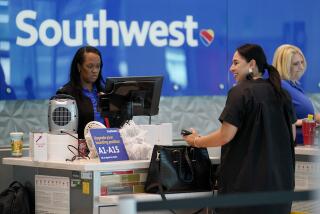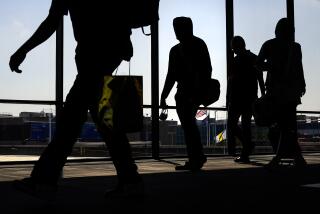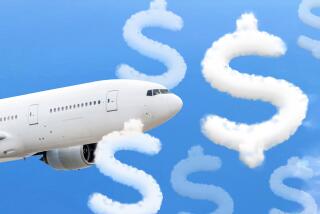Vacations to Cost More
- Share via
It’s beginning to look as if you can expect to pay a lot more for your vacations abroad next year.
Some tour packagers already are grumbling about the amount they are being charged for hotel accommodations and ground transportation services in some foreign countries. At this point, it looks as if prices for some European tours may rise by as much as 20% in 1988.
And it isn’t expected to end there. There are signs that price hikes will be felt in Australia and maybe in parts of South America.
It would be easy to lay the blame at the doorstep of the foreign hotels and motor coach companies. Some believe, however, that it all adds up to gouging--pure and simple.
But is that it? Another argument is that rate increases for tours are the result of a weakening dollar.
Looking Lopsided
Obviously, if a London hotel makes a fairly reasonable adjustment upward of 7% or 8% in room rates (quoted in pounds sterling) while the dollar is buying 10% or 12% less than it did a year ago, the price is going to look somewhat lopsided.
There is probably an element of truth to both views. The dollar is weaker, but some suppliers in London, Paris, Frankfurt, Rome and elsewhere may be taking unfair advantage of that, and other factors, to boost their prices.
And there’s not a lot we can do about it.
European suppliers long ago realized that it was not smart or necessary to put all their eggs into one tourism basket. They have been diversifying into other areas for several years, thus reducing their reliance on Americans.
The wisdom of that course was reinforced during the terrorist-inspired slump in traffic from this country to Europe, which peaked in the summer of 1986.
Who Needs Americans?
Now hotels in Europe aren’t as dependent upon Americans as they used to be, and so they’re not as accommodating as they sometimes have been.
What with an increasingly travel conscious and affluent Middle East population, among other factors, European hotels are well-patronized by visitors from there and from other European countries. Intra-Europe travel has become increasingly important at the same time that United States-Europe travel has become less so.
But those in the business of providing services for vacationers to Europe may be doing themselves a disservice. By some estimates, Americans spend three times as much as other nationalities when they travel. That’s money that may be diminished for the European tourism industry.
In any case, the primary responsibility of purveyors of tourism components is to sell their products at the best possible rates. That goes for coach and theme park operators, car rental firms, hotel executives and others.
As a result, we may have to take it on the chin in Europe next year.
Way Up Down Under
Then there’s Australia. Some predictions have prices of tourist-related goods and services rising by 25% to 30% over this year.
Australia is host next year to World Expo 88 in Brisbane, along with its own bicentennial celebration throughout the country. But it’s Sydney that’s the problem, according to some sources.
Not many people visit Australia without going to Sydney, and Sydney is a bottleneck; it just doesn’t have enough hotel rooms to cope. The result is inevitable: Prices are going way up.
In this instance, of course, it’s easy to make a case that they’re price-gouging. But it could just as easily be argued that they’re only getting what the market will bear.
Entire Area Affected
Australia’s pricing--Sydney’s pricing, in particular--will have an effect on tourism destinations farther afield. It will make package tours to much of the South Pacific more expensive.
Australia is such an integral part of so many South Pacific packages that it’s difficult to see how it could be otherwise.
Some U.S. operators also have detected an upward pressure on the prices of tourism services in Brazil and Argentina. These should make the least impact because they are lower-density markets.
The winner in all of this is likely to be domestic travel. It hasn’t been doing too bad lately, anyway, considering that terrorists frightened Americans away from Europe and Vancouver’s Expo provided a gigantic pull to the Pacific Northwest in 1986.
More to Read
Sign up for The Wild
We’ll help you find the best places to hike, bike and run, as well as the perfect silent spots for meditation and yoga.
You may occasionally receive promotional content from the Los Angeles Times.






